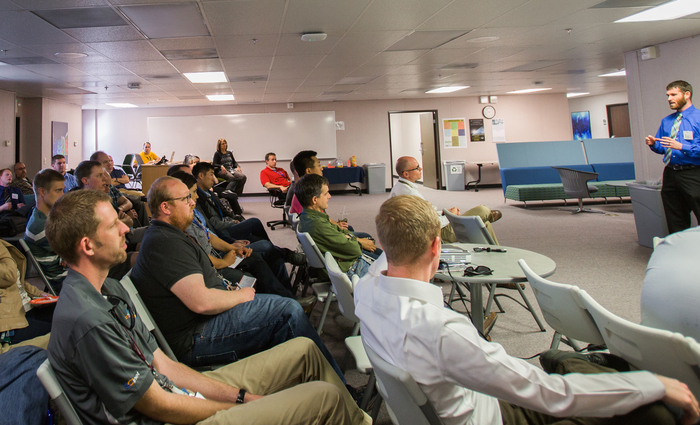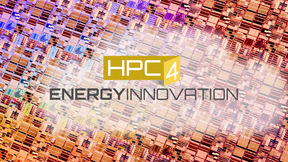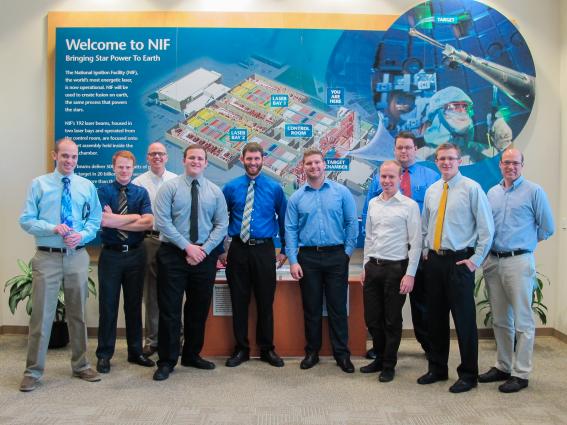Undergrad collaborations prime hiring pipeline
 (Download Image)
Brigham Young University student participants visited Lawrence Livermore in April to present their research. Through a program established this year, undergraduate students at the university are connecting with Livermore’s skilled Computation professionals and gaining access to its advanced supercomputing technologies.
(Download Image)
Brigham Young University student participants visited Lawrence Livermore in April to present their research. Through a program established this year, undergraduate students at the university are connecting with Livermore’s skilled Computation professionals and gaining access to its advanced supercomputing technologies.
Opportunities for students to garner experience from leaders in their fields are few and far between, but Brigham Young University (BYU) and Lawrence Livermore have created one such collaboration.
Through a program established this year with the help of Livermore’s Benjy Grover, computer science students in BYU’s undergraduate big data science capstone course connect with Livermore’s skilled Computation professionals and gain access to Livermore’s advanced supercomputing technologies.
Student participants each devote roughly 450 hours to a project selected by Livermore researchers and designed to be an appropriate level for students. BYU students gain work experience and learn how to interact with customers or sponsors, estimate deliverables and timelines, scope work, team up with experts from diverse disciplines, account for changes in project scope and handle real-world data. The students also build relationships with mentors and colleagues, which may lead to job opportunities or further research collaborations.
"Our collaboration exposes students to the diverse and complex projects national laboratories tackle, which could potentially help create a pipeline of eligible applicants," says Livermore’s Steven Magana-Zook, who helped mentor a BYU student team. "Connecting with the students prior to graduation gives us a hiring advantage in this highly competitive area."
This year, BYU student groups worked with Livermore to build a scalable seismic event detection system, to develop a software library to analyze high-performance computing (HPC) simulation data and to track illness using big data analysis techniques. Livermore researchers acted as mentors, providing high-level guidance and basic scope while allowing the students to determine their approach to each problem.
The 10 students worked remotely, leveraging the knowledge of their Livermore mentors (Magana-Zook, Michael Goldman, Brian Gallagher and Ming Jiang), as well as their computer science professors.
"Our mentors at Livermore provided much-needed data science experience and even more essential specific domain knowledge about the project we were working on," according to Jonathan Belyeu, a bioinformatics student who helped build the seismic data analysis system. "Our team was impressed by how knowledgeable and helpful our mentors were."
Though some students may not be entering into a professional career immediately following graduation, their new HPC knowledge helps prepare them for other paths, such as higher education. "I have gained skills I intend to use while in my molecular bioscience Ph.D. program at the University of Utah," Belyeu said.
Furthermore, participation in this program has made the students more competitive and attractive to recruiters, opening additional learning opportunities. For example, Belyeu says he was contacted by a prestigious firm to participate in a data science summer internship program because of the experience he gained at Livermore.
While working for the Laboratory is a unique opportunity for students, the institution also benefits from the project support. "The student team we mentored completed a technical investigation that my colleagues and I had hoped to conduct ourselves, but did not have the time," Magana-Zook said. "The students’ work provided great feedback on the future direction of our efforts, with a very small time commitment on our end."
- Lanie Rivera
Contact
Don Johnston[email protected]
925-423-4902
Related Links
Computation at LLNLBrigham Young University
Tags
HPC, Simulation, and Data ScienceComputing
Careers
Community Outreach
Featured Articles








